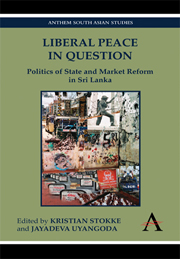Book contents
- Frontmatter
- Contents
- List of Illustrations
- List of Contributors
- 1 Liberal Peace in Question: The Sri Lankan Case
- 2 Travails of State Reform in the Context of Protracted Civil War in Sri Lanka
- 3 Fallacies of the Peace Ownership Approach: Exploring Norwegian Mediation in Sri Lanka
- 4 The Politics of Market Reform at a Time of Ethnic Conflict: Sri Lanka in the Jayewardene Years
- 5 From SIHRN to Post-War North and East: The Limits of the ‘Peace through Development’ Paradigm in Sri Lanka
- 6 Buying Peace? Politics of Reconstruction and the Peace Dividend Argument
- 7 Women's Initiative in Building Peace: The Case of Northern Sri Lanka
- 8 Liberal Peace and Public Opinion
- Notes
- References
6 - Buying Peace? Politics of Reconstruction and the Peace Dividend Argument
Published online by Cambridge University Press: 05 March 2012
- Frontmatter
- Contents
- List of Illustrations
- List of Contributors
- 1 Liberal Peace in Question: The Sri Lankan Case
- 2 Travails of State Reform in the Context of Protracted Civil War in Sri Lanka
- 3 Fallacies of the Peace Ownership Approach: Exploring Norwegian Mediation in Sri Lanka
- 4 The Politics of Market Reform at a Time of Ethnic Conflict: Sri Lanka in the Jayewardene Years
- 5 From SIHRN to Post-War North and East: The Limits of the ‘Peace through Development’ Paradigm in Sri Lanka
- 6 Buying Peace? Politics of Reconstruction and the Peace Dividend Argument
- 7 Women's Initiative in Building Peace: The Case of Northern Sri Lanka
- 8 Liberal Peace and Public Opinion
- Notes
- References
Summary
After the defeat of the Liberation Tigers of Tamil Eelam in 2009, the Sri Lankan government and international donors embarked on massive efforts at ‘reconstructing’ the war-torn areas in the north and east of the island. A closer look at the rhetoric surrounding these efforts shows that they are not only about the physical rebuilding of houses, livelihoods and infrastructure. There is also a hope that reconstruction can consolidate peace by making the benefits of peace clearly visible to the people and thereby preventing them from supporting new violent rebellions. ‘Post’-war reconstruction and the ‘buypeace’ thinking that comes with it is not new to Sri Lanka. Rather, it has been pursued at various stages during the ups and downs of conflict during over two decades. This chapter takes a critical look at the role of reconstruction during the peace process that was initiated in 2002, to see what the peace dividend debate from that time period can teach us about politics of reconstruction and popular support for peace.
When I visited Aleweddy in Jaffna peninsula in northern Sri Lanka in 2005 – over three years after the signing of the ceasefire agreement between the Sri Lankan government and the Liberation Tigers of Tamil Eelam (LTTE) – the village was in a process of cautious reconstruction. Aleweddy had been abandoned and under army control since 1992, but the cease-fire had enabled the villagers to return home after a decade or more of displacement.
- Type
- Chapter
- Information
- Liberal Peace in QuestionPolitics of State and Market Reform in Sri Lanka, pp. 121 - 140Publisher: Anthem PressPrint publication year: 2011
- 2
- Cited by



